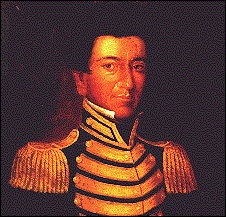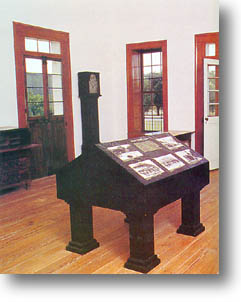General Information-
 Founded as Walnut Springs
in 1838 by members of Mathew Caldwell's Gonzalez Rangers, the
name changed in 1839 to honor Juan N. Seguin,
distinguished Mexican-Texan who served in Sam Houston's army which won Texas
independence. Later Seguin served as a Texas senator and mayor of San Antonio. Founded as Walnut Springs
in 1838 by members of Mathew Caldwell's Gonzalez Rangers, the
name changed in 1839 to honor Juan N. Seguin,
distinguished Mexican-Texan who served in Sam Houston's army which won Texas
independence. Later Seguin served as a Texas senator and mayor of San Antonio.
Fishing, swimming and water sports are popular in the area,
with five hydroelectric dams on the Guadalupe River within
six miles of town.
Guadalupe County is noted for its pecan harvest with produce
shipped across the nations. In fact, right on the courthouse lawn, Seguin proudly
displays "the world's largest pecan". Also, peach orchards, Christmas tree
farms, and diversified agricultural businesses contribute to the local economy.
Bed and breakfast accommodations available in historic
buildings.
Historic Homes and Buildings -
Many pre-Texas Revolution buildings designated by historical
markers dot the city streets. The Seguin Conservation Society proudly shows off its
historic preservation efforts with properties owned and managed by the society.
These include the Los Nogales Museum, Dietz
Doll House, Campbell Log Cabin, the Moore House, and the Texas Theater.
Information on these sites can be obtained from the Chamber of
Commerce at 427 North Austin Street, or by calling 830/ 379-6971 or 1-800-580-7322.
Juan Seguin Burial Site -
On a hillside across from the coliseum, a monument marks the
grave of Texas patriot Juan Seguin. The inscription on
the grave depicts his life.
Lakes -
Lake Placid is a small lake on
the Guadalupe River southwest of Seguin. Lake McQueeny, five miles to the northwest, is touted as
"water ski capital of Texas".
Los Nogales Museum -
Built in 1823 by the Mexican government for use as a post
office, the building was known as the Juan Seguin Post Office
between 1835 and 1870. The museum contains Texas historical papers, pictures and
furniture.
Open by appointment. East Live Oak and South River
Streets.
Sebastopol House State Historic Site -
Also known as the Zorn Home;
built in early 1850's, the house is fronted by a traditional high columned porch.
Probably named for the Russian naval base during the Crimean War. Unusual split
level T-shaped residence made of limecrete (an early form of concrete) and detailed with
Greek- Revival style architecture. The Structure received the U.S. Department of
Interior's Award of Merit, and plans of the house are on file with the Library of
Congress. Recently restored by Texas Parks and Wildlife Department to its mid to
late 1870's appearance with period furnishings. Exhibits recount original
construction and restoration processes and history of the house.
Open Friday - Sunday 9a.m. - 4 p.m. 704 Zorn
Street. Admission.
Seguin Wave Pool -
Catch the wave in the gigantic wave pool in Starcke Park East. Ride the waves or play in the splash
pool. Playground and picnic area under giant pecan trees. Open May - August.
Texas Lutheran University -
This nationally recognized university attracts students from
around the world at its 160 acre campus between U.S. 90 and U.S. 90A.
"True Women" Tour -
Seguin native Janice
Woods Windle's
book reflects the lives of pioneer women with many episodes occurring in Seguin. The
Seguin Conservation society and the Chamber of Commerce have developed tours taking
readers to sites mentioned in the book. Self guided tour maps are also at the
Chamber of Commerce office at 427 North Austin Street.
For additional information, call 830/ 379-6382
Walnut Springs Memorial Rose Garden -
Rose garden recognizes the town's formation and early
history. It its at the corner of Donegan and Travis Streets. Rose bushes trace
the old stagecoach route to Walnut springs. Rose bushes are provided by the Seguin
Garden Club.
Visit: The Seguin Outside Guide for more information!
Visit: The City
of Seguin Homesite for more inormation!
Visit: The Seguin
Chamber of Commerce website for more information!
|


